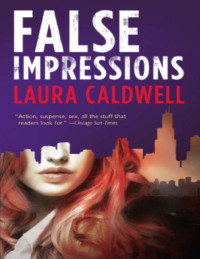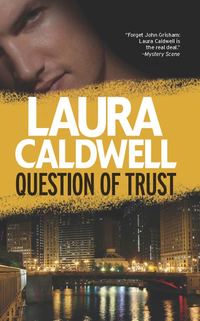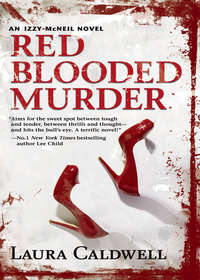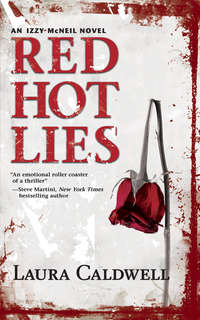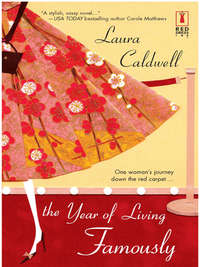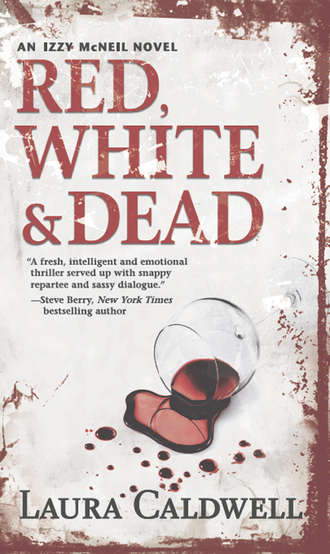
Полная версия
Red, White & Dead
I tried to think of something to say, but it was clear there would be no chatting with these guys, no talking my way out of the situation.
It didn’t matter anyway, because Dez charged around the car toward me. Instinctively, I moved back again, bouncing against the door. And then I was propelled forward as the door opened behind me. I was only a foot from Dez now, Michael behind him.
I felt a hand grip my arm and yank me back, hard, into the stairwell. The security guard. It must be.
“No!” I yelled, thrashing against him. “No!”
But the guy pulled me in farther, and then he did the strangest thing. He slammed the door, right on the puzzled faces of Dez and Michael.
It was black in the stairwell. I could see nothing. Dez’s and Michael’s fists battered the door from the outside, sounding like tribal drums, loud and menacing and alerting everyone of more danger to come.
I struggled against the grip of the security guard, and to my surprise he let me go.
“You’re okay,” he said.
I trembled a little, wanting to run but unable to see anything, not knowing where to go. It sounded as if Dez and Michael were pounding the door handle now, trying to break it.
“You have to leave,” the man said. “You need to get out of here.”
Why did his voice sound familiar, as if I were listening to the note of a song I had heard only a few times?
I felt a touch on my wrist. “Stop!” I yelled out of sheer instinct, pulling it away. In the deep dark of the stairwell, the movement made me feel dizzy, and I willed myself to stand straight.
“Let me show you the banister,” he said. “Walk down the steps and out onto the street. Get away from here as fast as you can.”
“But …”
Scratching sounded from the direction of the door handle now, as if Michael and Dez were putting something in the lock.
“Hurry,” the man said. “They’ll be in here very soon.”
Enough of a threat to get me moving. I tucked the purse tighter under my arm and clutched both shoes in my left hand. The man touched the wrist of my right hand again, and this time I let him lead me to the banister.
“Hold tight,” he said. “Be careful. But please go as fast as you can.”
I took one step, then another. Then I stopped. “Thank you,” I said.
“You’re welcome.” Again, there was a distantly familiar quality to his voice.
I turned and put one foot on the lower step and then the next. I began to get the hang of it, despite the blackness around me. When I got to a landing, I shuffled my feet forward, looking for where the next steps began. Upstairs, I could hear more thrashing at the door.
Then, for a moment it quieted, and I heard the man speak. “Go. You’re okay now, Boo.”
The pounding at the door continued. An injection of fear kept me moving, finding the staircase, taking the steps faster this time, until I reached the street and pushed open the door, the streetlights hitting my eyes like a blast. I blinked and looked around. No sign of Michael or Dez. Not yet.
I saw a cab, lights on, across the street. I ran to it, yanked open the door and hopped into the back. Breathlessly, I gave my address on Eugenie Street.
It was only when the cab had driven eight blocks that I stopped looking behind me. Then I closed my eyes, laid my head on the back of the seat and let myself hear the last words the man had said.
You’re okay now, Boo.
Was that right? Had he actually said that?
I forced myself back to that moment, listening intently to the memory.
You’re okay now, Boo.
Boo was the nickname my mother used for me. No one else had ever called me that. Except my father.
And he had been dead for almost twenty-two years.
2
“Let’s get tattoos.”
I looked at my friend Maggie. “What are you talking about?”
It was Monday, the day after my night with Dez Romano, and needing a warm and welcoming face or two, I had texted my best friend, Maggie, and my former assistant, Q, and was happily surprised when they were both available for lunch. Q, who was also unemployed but living with his very wealthy boyfriend, picked me up and took us into the Loop to meet Maggie at a pub near her office.
Maggie and I ordered the fish and chips. Maggie ate greedily, the way she does when she finally remembers to stop working and eat, while I sort of picked at the fries and poked at the fish with my finger, unable to muster an appetite. Q, who was eternally on a diet to avoid a persistent belly, his personal nemesis to the perfect gay physique, gave a sullen stab at his plain chicken breast and pushed it away.
You’re okay now, Boo.
I’d called Mayburn when I got home last night, telling him about the debacle at Gibsons, about being chased, about hearing those words. He wasn’t too impressed by the “Boo” thing, but he’d been worried and upset about Michael and Dez being after me. He told me to keep a low profile, to watch for anyone tailing me. I don’t think he would consider having lunch in the Loop “low profile,” but sometimes you’ve simply got to be with friends.
“We need something new,” Maggie said. “At least I do.” She dunked a piece of battered fish into a ramekin of tartar sauce and popped it in her mouth. “And a tattoo is a way to signify something new in your life, like a new chapter.”
“Who told you that?” Q asked.
She shrugged. “That’s what people say.”
“That’s what they say after they get a tattoo, so they can justify it. So they can live with themselves.”
Maggie stopped eating and gave a slightly dejected look.
“Mags,” I said. “Your family would kill you if you got another tattoo.” Maggie came from a big South Side Irish family, and they barely tolerated the tiny shamrock she got on her ankle during a college spring break.
“I’m thirty,” she said. “I can do what I want. I don’t care what they think.”
Q and I laughed. Maggie did, too. Yes, Maggie was very much an adult, helping to run the criminal defense practice started by her famous lawyer grandfather, trying cases in courthouses all over the state. But her family was as thick as the thieves she represented. They spent most of their free time together, they knew everything about each other, and Maggie very much cared about their opinions.
I bit into a french fry, thinking about my recent exposure to tattoos. The last guy I dated—a twenty-one-year-old wunderkind of the computer world named Theo Jameson—had boasted a plethora of tattoos around his stunning body. A gold-and-black serpent slithered sexily around one arm, a red ribbon on the other. High on his left pec was an Asian-looking symbol. I’d never learned what it meant. We only dated a short time. He’d been too young for me, although that wasn’t why we broke up.
Lately, Theo lingered in my mind just as much as Sam, my ex-fiancé, maybe more so because Theo had started texting me again recently.
I miss you … he’d say. I think about you 300 times a day. And the last one—I have blood oranges.
One late night a couple months ago, Theo came to my apartment with a bag filled with small oranges tinged a sultry crimson color. He made us screwdrivers. He squeezed juice on my wrists and licked it off.
I smiled as I chewed now, thinking about it.
Q saw my look. Knowing me well, he asked, “Theo?” before attempting another bite of his chicken breast.
“Yeah.”
Q and Maggie hadn’t met Theo, but I’d given them a detailed description of him, as well as a somewhat sanitized version of the nights we’d spent together.
“Is he still texting you?” Maggie asked.
“Yeah.”
“What are you going to do about it?”
“I have no idea.”
“Do you want to see him?”
“I haven’t had sex in almost two months. And that kid is sex on a stick. What do you think?”
Maggie groaned, stopped eating momentarily. “I so understand.” Recently, Maggie had taken a second shot at a relationship with an older, scoundrel type named Wyatt. And for the second time, Wyatt proved his scoundrel status, landing Maggie and me into singledom at the same time, something that hadn’t happened since we’d met our first year in law school.
“A sexual dry spell?” Q said, smiling despite the lunch he’d pushed away again. “I can’t even remember what that’s like.”
“Shut up,” Maggie and I said in unison.
Q kept smiling.
“What about Sam?” Maggie asked me.
“What about Sam?” I repeated, as if by saying the question out loud someone external, or maybe someone deep inside me, would answer definitively. But as usual, only more questions popped up: Could we ever recapture what we had? Should we stop wondering about recapturing and consider redesigning? And then came that question, always that brutal question that scared the others, and even the other possible answers, into complete silence: Was it over between us for good?
Sam and I had met through Forester Pickett, a Chicago media mogul we both worked for—me as a lawyer and Sam as a financial advisor at a private wealth management firm. When Forester was killed, our worlds spun out of control. And I’m not using that phrase—out of control—the way I previously used it when I was on trial or in the middle of a particularly nasty contract battle. Everything is so out of control, I would say back then, having no idea what that really meant.
In the aftermath of Forester’s death, we tried to put back together the team that was Sam and Izzy, Izzy and Sam, but something was missing. And lacking the tools to adequately describe it, or maybe just lacking the tools to adequately ride it out and shift our worlds around, we dated other people and then officially broke up. The breakup came right about the time Theo and I ended, too—right about the time I ended the minor romance that sprung up with my friend Grady.
And so for the last two months, it had been just me. I spent time with Q and Maggie. I saw my family, too— my brother, Charlie, my mom and her husband, Spence. That friend and family time had helped me to arise from the fog I’d started carrying around, but I agreed with Maggie that maybe we both needed something new.
“Look,” I said, ignoring the question about Sam. “Tattoos aren’t going to help. We need something else.”
“You do,” Q said. “It’s almost your birthday.”
“That’s right!” Maggie said. “Ten days from now. What do you want to do?”
I thought about it. “I guess I just want to be around family and friends. Does that sound too boring?”
“Kinda,” Q said.
Maggie pushed her plate away. “No, c’mon, you need something.” Suddenly, she sat up tall, brushing her wavy, golden-brown hair out of her eyes. “A vacation!” she said. “That’s it! We’ll celebrate your birthday by getting the hell out of Dodge.”
“Shane and I are going to St. Bart’s,” Q said. “You could come with us.”
I leaned back against the booth. “I don’t have the cash for a vacation.”
Maggie sighed. “And what am I talking about? I don’t have the time. I’m on trial later this week. But maybe if we just started planning something it would motivate us, give us something to look forward to. We’ve always talked about going to Prague.”
“And Paris.”
“And London.”
“And back to Italy.” Now I sat upright. Maggie and I had done a study-abroad program after our first year in law school.
Maggie saw my excited look and read my thoughts. “Is your aunt still living in Rome?”
I nodded fast. “As far as I know.”
“Do you think we could stay with her?” Maggie asked. “That would help with the cost.” The truth was Maggie made more than enough to head to Rome for a week or two or four, but I appreciated that she was trying to be sensitive to her newly cash-strapped friend.
“I haven’t talked to her in a long time, but I could ask.” I could definitely ask, and not only because we wouldn’t have to pay for a hotel, but because other than my mother and brother, my aunt was the only person who had also known my father. Elena, my father’s sister, had been living in Rome for decades. When Maggie and I went to school there eight years ago, Aunt Elena had taken us to our first meal in Rome—at a restaurant right next to the Pantheon called Fortunato. But unfortunately, she had been out of town the rest of that month, and we didn’t get to spend any more time with her.
Yet she was exactly the person I wanted to spend time with now.
You’re okay now, Boo.
I hadn’t told Maggie or Q about last night. Under Mayburn’s rules, I couldn’t tell anyone about the fact that I was his part-time, off-the-books employee.
I’d started working with Mayburn last fall when Sam had disappeared after Forester’s death, and in return for looking into the matter, I’d agreed to freelance for Mayburn. The whole reason I need you, he’d said, is because you’re a typical, normal North Side Chicago woman. If there’s any inkling that’s not the case, if anyone knows you do P.I. stuff on the side, it won’t work. I had argued that I should be able to tell my close friends, but Mayburn wouldn’t budge. If one of those people lets it slip to someone else, he’d said, it wouldn’t end there; word would get around.
I wasn’t so sure I cared anymore about a freelance investigator gig, especially when it got me into the kind of scariness it had last night. I’m a girl who likes to be chased as much as the next, but only in a romantic sense, not in a Mob-is-about-to-kill-you kind of sense.
And yet I couldn’t shake the sound of that man’s voice, the way he’d called me by my childhood nickname, Boo. Or at least that’s what I thought I’d heard. The further I got away from it, the more I doubted myself. But I still wanted to poke around a little, to see if I could find anything out about my father, if there was anything to find out. The man had been dead for almost twenty-two years after all. But no one aside from my mother, used that nickname.
A way to fish around about my dad was to reestablish contact with my aunt Elena.
“Mags,” I said, “I think you’ve got something here.” I lifted my napkin and tossed it onto my plate. “I’m calling her tonight.”
3
He watched her leave the restaurant, her steps casual, unhurried. And yet her shoulders were tight, her head swiveling. She pivoted once or twice, as if she couldn’t decide which way to go, but then he recognized what she was doing. She was getting a feeling, sensing surveillance. And she was right. He watched as she stopped at the window of an office-supply store. To passersby she probably looked as if she was simply smoothing the front of her yellow summer dress, merely tugging a few stray red curls into place. But he knew what she was really doing.
She couldn’t identify the source of her suspicion, he could tell, and so after another few fast glances in the glass at the people around her, at the cars on the street, she turned and kept moving. Her body appeared more relaxed now. Apparently, she had decided she wasn’t being followed.
She was wrong.
He just hoped he was the only one.
4
I walked home from my lunch date to savor the summer weather—crisp without being cool, sunny without being blazing, breezy without the lake winds blowing your skirt around your ass. Usually, I would be on my scooter—a silver Vespa—but Q had driven me to lunch. With so much time on my hands and considering the fact that Chicago receives approximately four and a half-perfect weather days like this, I figured I had to make the best of it.
The streets were crowded with people. Everyone had a bustle to their steps, it seemed. Everyone had a purpose. You could tell the lawyer types who were dashing to court or a deposition. You could spot the salespeople pulling product in small wheeled suitcases. When I’d been one of those dashing lawyers, I was always jealous of someone like me, someone dressed casually the way I was in flip-flops and a yellow cotton dress, someone who clearly didn’t have to rush anywhere. But being on the other side was starting to depress me—knowing that I wasn’t just playing hooky for the afternoon or taking a much-needed sabbatical, knowing that I was out of work and out of prospects and almost out of my twenties.
Plus, all those people on the street, and the fact that a crowd made it easy to tail someone, began to make me nervous, made me think about Dez and Michael, and wonder if they knew who I was, if they were looking for me. And of course, thinking about Dez and Michael made me think of that stranger in the stairwell.
It was one night, when I was about five years old, that my father had given me my nickname. I’d woken up crying after a sinister dream. He tried to console me, but nothing worked. In the span of six hours, I’d grown fearful of the dark. My dad told me then that if you were afraid of something, you should look it straight in the eye. I didn’t know what he meant, and he must have seen that.
“What are you afraid of in here?” He gestured around my bedroom, lit only by the tiny lamp in the shape of a shell that sat on my nightstand.
I looked around. Nothing appeared particularly scary. “I don’t know.”
“Ghosts? You’re scared that they’ll say, ‘Boo’?”
“I guess.”
“Well, there’s nothing scary about that. Nothing scary about ghosts, either. They’re just people who aren’t here anymore, stopping back in to say hi. Except they say boo.”
That sounded rather simple. And not at all terrifying.
“Okay?” Under his round copper glasses, my dad’s eyes sparkled, as though a laugh was just about to hit him. I loved when he looked like that. It made everything seem fine.
“I guess …” I said again, the fear still lingering a bit the way bad dreams do.
“You guess? What kind of answer is that?” My father looked at the ceiling and acted as if he was thinking hard. “I’ll tell you what. I’m going to call you Boo. Just for a little while, so that if you ever do see a ghost and they say that to you, you won’t be scared. You’ll have heard it before. Okay, Boo?”
I liked it. I’d never had a nickname before. “Okay.”
It had been a thing between the two of us, just my dad and me. After he died when I was eight years old, my mother picked up the nickname, as if by using it she could keep him a little bit alive. But I had never seen a ghost, never heard one. Until last night in the stairwell.
When I got to the Chicago River, I began to feel I was being watched. I swung my head around, but it didn’t appear as if anyone was following me. I kept walking, paying attention to everyone I passed, and it seemed as if a lot of people were looking right at me, expressions of recognition on their faces. It was hard to tell if any of the people were tailing me or if their expressions were simply the type I’d witnessed frequently over the last couple of months—looks that said, I saw her on the news, I think. Yeah, she did something wrong.
The fact was, I hadn’t done anything wrong, but after my friend died in the spring, the Chicago cops had suspected me of her murder. As a result, my image was flashed across the news stations for a week or so. Thankfully, mine was a flash-in-the-pan story, but I still got those looks with some regularity. I hoped Dez hadn’t seen the story, or hadn’t remembered it.
I dropped my gaze as I crossed the bridge in front of the Merchandise Mart, not wanting to meet anyone’s eyes for too long. I reached into my bag for my cell phone.
“Hey, Iz.” My brother answered on the first ring, which he almost always does. He’s one of the few people I know who actually answers their phone on a consistent basis.
“What are you doing? Want to take a walk in the park or something?”
“Yeah, meet me at Mom’s. I’m over here, using their printer.”
“Are they home?” “They” was my mother, Victoria McNeil Calloway, and her husband, Spence. The two were mostly joined at the hip, and mostly at home now that Spence had retired from his business—a real estate development company that provided consulting around the country.
I loved being with my mom and Spence, but I wasn’t ready to see them now. You couldn’t just waltz up to someone on a beautiful Monday afternoon and say, “Hey, any chance your husband, who died two decades ago, is alive?” I could barely ask myself that question. It was really too ridiculous. But Charlie was hard to fluster.
My mother lived on State Street in an elegant gray-stone house, a few blocks north of Division Street. Charlie was waiting for me on the steps, his tall frame leaning back casually on his elbows. His loose, curly brown hair glinted in the sun with a hint of red I’ve always told him he got from me.
He came down the steps and we hugged, then wordlessly started walking down State Street to Lincoln Park. We wandered behind the Chicago History Museum, crossing the street and passing by the entrance to the zoo.
When we reached Café Brauer, we went behind it to the small pond, where paddleboats were rented by tourists or families. Some of the boats were forest-green, others white and shaped like huge swans.
Charlie pointed. “Remember when Mom used to take us on those?”
I nodded. “Mom and I would paddle and let you think you were doing all the work.”
Charlie shook his head. “Yeah, and being the sucker I am, I believed it. Thought I was the man of the house.”
“You were the man of the house.”
We both laughed. Charlie has always possessed a lazy streak. It’s not that he’s stupid. Quite the contrary. Charlie is a reader of history, a lover of art and music. And trumping those things, Charlie is a lover of red wine and naps.
In fact, most of his friends—and sometimes even my mom and I—had taken to calling him “Sheets” because he spent much of his time in bed, a trait that had intensified after college. Charlie had graduated with a degree in English and a desire to do absolutely nothing. A friend’s father took pity on him and gave him a job driving a dump truck to and from work sites, which Charlie liked just fine because during down times, he was allowed to doze in the trailer. He might have gone on like that for decades, but one day the truck turned over on the Dan Ryan Expressway when a semi cut him off. He broke his femur, screwed up his back and ended up with a fairly hefty settlement from the semi’s insurance company. In his usual cheerful way, “Sheets” took it as a windfall and had spent the last few years sitting around, reading, getting the occasional physical-therapy session and, yes, drinking red wine.
“Let’s sit.” Charlie pointed to a bench at the side of the lagoon that was shaded by a patch of vibrantly green trees.
He took a seat, his long arm on the top of the bench. I arranged myself cross-legged and looked at him, trying to figure out how to tell Charlie what I’d heard, or thought I’d heard, last night. I stared across the pond at a bridge that spanned one edge of it, at the Hancock building and the skyline beyond that.
Ever since Charlie and I were little, I was the more serious, the one who worried enough for everyone, the one who analyzed a situation ten ways before deciding what to do, while Charlie mostly rolled along. I needed him to analyze this one with me, though. I wouldn’t tell him about working for Mayburn, but I had to tell Charlie that I thought I’d heard our father’s voice.
“So I was on Mom’s computer,” Charlie said, before I could form my words.
“Working on something for You Tube?” Charlie produced funny little movies filmed on the streets of Chicago. He shot them in black and white and set them to old-fashioned French music. It was kind of hard to explain, but they were really quite charming, and he had developed a coterie of people, mostly female college students, who loved them and as a result, loved Charlie, as well.
“I was working on my résumé.”
“Really?” I tried not to sound surprised. Charlie had talked about looking for a job—after years of living off his settlement check, it was starting to dry up—but somehow it was impossible to imagine him getting up and doing something besides deciding between merlot versus cabernet.




